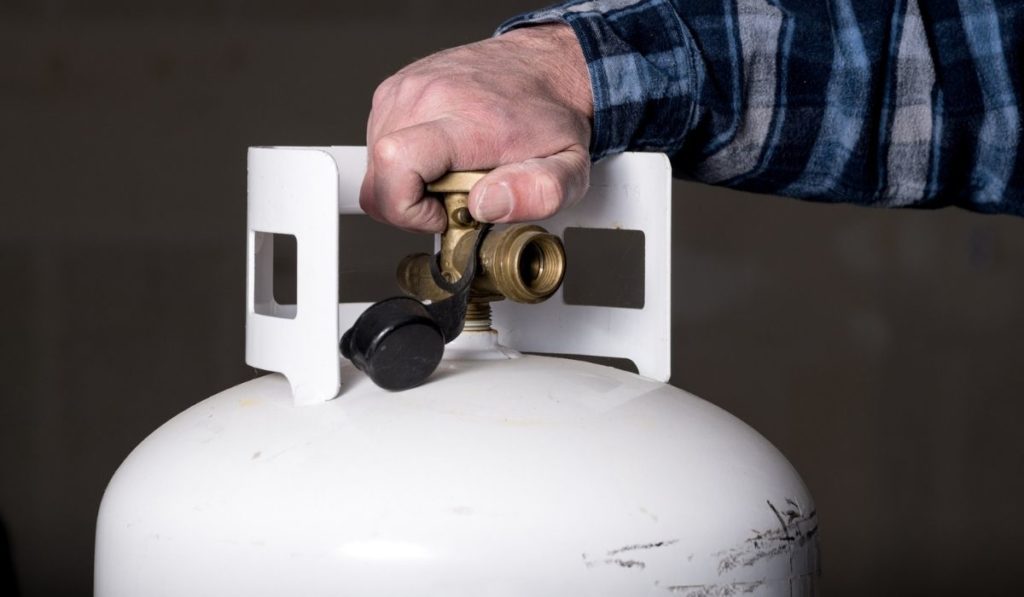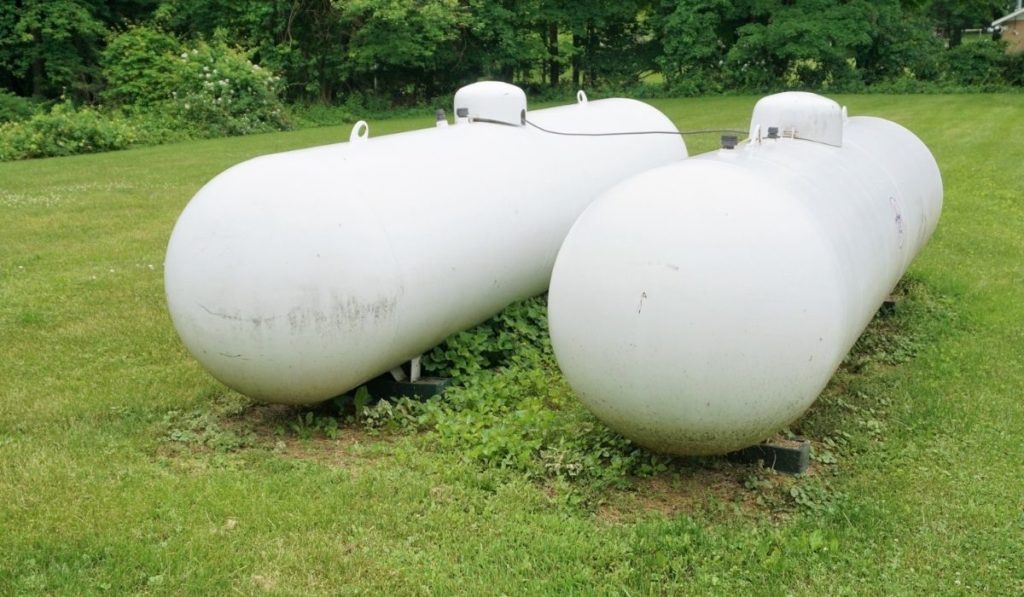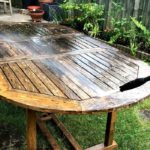We all know that propane gas is an efficient and affordable way to cook, generate electricity, get hot water, and heat your home. But are you aware of the dangers associated with improperly handled propane and the damage it can cause to your house, or even worse, your health?
Propane tank explosions are uncommon, but it’s still important to take the right safety measures to prevent them from occurring. You should try to avoid storing the tank in confined spaces, perform regular leak checks, and consider installing a gas detector when indoor storage can’t be avoided.
It’s extremely important to take the right precautions and follow the best safety practices when handling fuel lines, propane appliances, generators, and tanks, to ensure your safety. Let’s look at the reasons behind propane tank explosions and what you can do to prevent them, so you don’t have to worry about your safety anymore!
What Are Propane Tanks?

To put it simply, propane tanks are storage containers for liquid propane that properly contain the fuel at high pressures. They are available in a wide range of sizes and are designed for installation at the location preferred by the customer.
Smaller tanks are usually used for camping or barbecuing, while larger ones are temporarily installed in situations where usage and demand requirements are generally higher.
All propane tanks are designed following a rigid set of rules to ensure the safety of service technicians, users, and the general public. They’re only filled to around 80%, which is generally accepted as a ‘full’ tank of gas.
Propane tanks are usually constructed with steel, but they can also be manufactured with aluminum or other composite materials. The most popular size of a propane tank is the 20-pound cylinder that’s commonly used for patio heaters and barbecues.
Most tanks come with a 12-year certification period (stamped during manufacturing), after which they must be retired from service or re-certified.
Can Propane Tanks Explode?
Although propane tank explosions are very uncommon, there are a few situations where they can happen. The propane tank might develop a leak, releasing fumes that ignite and cause fires and explosions. If the fire is not contained, it can damage your house and your life.
Why Would a Propane Tank Explode?
A few reasons why a propane tank might explode include:
A Compromised Container
The liquid propane in propane tanks releases explosive fumes that can damage the container. Tanks gradually puncture and corrode, resulting in holes through which the gas can escape and ignite.
There are several other factors that can compromise the structural integrity of the propane tank, such as an object colliding with the tank. For instance, someone might hit the tank with their car, damaging it and creating a hole through which the gas can escape.
Ignition
A simple spark can ignite gas leaks and cause irrevocable damage to both your property and life. Just as you need a spark to ignite a natural gas stove, you also need a spark to ignite a room full of gas.
You can also ignite propane with the burning tip of a cigarette (as seen in many action movies), so make sure you don’t smoke anywhere near the tank.
If a spark ignites propane, it can start a fire that spreads quickly. However, if you don’t ignite the gas and let it accumulate, it forms a combustible fuel-air cloud that can explode if ignited.
If the increase in gas pressure is small and does not generate enough force, the explosion will only be minor and will not cause much damage. But that doesn’t mean all gas explosions are harmless. Larger explosions can cause fires, leading to injury and damage to property.
If nothing ignites the combustible fuel-air cloud, it will eventually start to dissipate. The size and force of the explosion ultimately depend on the concentration of the fuel, the ignition strength, the structural integrity of the tank, the fuel type, where the fuel ignites, and the location of the vents.
Confinement
Propane is a compressible fluid with widely spread-out molecules. The force of a gas explosion also depends on the size of the area where you keep the propane tank and the total amount of gas in the tank.
In open space, the gas can spread out and dilute. However, in a small, confined space, the pressure of the gas builds up and damages the containing structure.
For example, if you keep a propane tank in a small garage that doesn’t have proper ventilation, a leak in the tank can quickly fill your garage with gas. Since the gas will be confined in the garage, it will increase the temperature and force of the explosion.
Larger concentrations of propane also release more energy, continuously burning more heat at a higher temperature until the fuel eventually runs out.
How to Safely Use Propane Tanks
If handled properly, propane can be a very safe and versatile fuel. Here are some important safety tips on how to use propane tanks:
Handle the Tanks With Care
- Don’t store or use propane tanks in your basement or living space.
- Don’t leave a portable propane tank in cars or any other closed vehicle.
- Hire a professional propane service retailer for installation and setup.
- Secure the tanks properly during transportation.
- Secure propane tanks if you’re using them for cooking, heating water, or building heat.
Use Propane Appliances Carefully
- Don’t use propane barbecue grills indoors.
- Avoid using propane ovens or stoves for heating purposes.
- Hire a qualified service technician to connect your propane appliances and perform leak tests.
- Don’t use electric generators inside. Make sure you keep them outside your house.
Smelling gas? Here’s What You Need to Do
- Extinguish all open flames and smoking materials as soon as possible.
- Completely evacuate the area where you suspect the gas leakage has occured.
- Turn off your propane tank’s gas supply valve if it’s safe for you to do so.
- Once you’re safely away from the leak, call your propane supplier. If you’re unable to contact them, call 911.
- Don’t go back to the area where you smell gas until your emergency responder, qualified service technician, or propane retailer tells you it’s safe to do so.
- Get all your systems checked. Before you use any of your appliances again, ask your service technician or propane retailer to check your system for any leaks.
Perform a Leak Check
In most states, qualified service technicians or propane retailers must check your propane system for leaks before they turn on the gas.
Arrange for Regular Deliveries
It’s advisable to set up a regular delivery schedule with the help of your propane retailer. Make sure you also check your propane tank’s fuel gauge on a regular basis. Contact your propane retailer if the propane falls below 20%.
Install Propane Gas Detectors
In certain cases, you might not be able to smell a propane leak. There can be several reasons behind this, such as:
- Rust, water, or air in the propane tank can decrease propane odor concentration.
- Propane odor might stick to the internal surfaces of the piping or distribution systems.
- If the leakage is underground, the passage through the soil might reduce the propane odor.
Propane gas detectors, like the Kidde Nighthawk Detector (on Amazon), sound an alarm when they sense propane in the air. It’s advisable to install a propane detector if you or anyone else in your house has difficulty identifying the smell of propane or if you keep your propane appliances in rarely-used areas where you might not be able to detect a leak.
These devices provide an additional level of security. The quality of the detector is extremely important as well, and it’s better to go for options that are listed by Underwriters Laboratories.
To ensure your propane gas detectors function properly, install and maintain them according to the instructions provided by the manufacturer. Make sure you also have a qualified propane service technician check your propane appliances and system for a leak.
How to Safely Store Propane Tanks

In order to prevent propane tank explosions, it’s important to store them properly. Here are a few helpful tips:
Storing Propane Outdoors
It’s perfectly safe to store a propane tank outdoors, but it’s better to choose an area that’s far away from your house. Remember that freezing temperatures don’t normally affect propane, so you don’t have to take any special measures for winter storage.
In fact, you don’t even have to worry about covering the tank when storing it outside during winters, unless you live somewhere where temperatures are insanely cold.
Place the propane tank on a hard, stable surface, such as a slab of concrete or a sturdy piece of wood. You can keep it covered or uncovered.
It’s very easy to store a propane tank in the summer. In warm weather, you can keep it outdoors on a sturdy, flat surface. However, you’ll need to make sure that it’s not in direct sunlight for an extended period of time. It’s advisable to store the tank in a shaded area so that its temperature does not exceed 120˚F.
Indoor Propane Storage
It’s safe and convenient to store a propane tank indoors, but only with the right setup. Never keep a propane tank in your living space or in any area that’s attached to the house.
It’s advisable to store a propane tank in a detached shed or garage. These structures are well-ventilated and protect the tank from direct sunlight in both cold and warm weather.
Keep the tank on level ground, and make sure that there aren’t any electrical tools or flammable materials near it.
General Propane Storage Tips
It’s essential to take the right precautions with your propane tanks. Here are a few more tips that can help ensure your safety:
- Never store or subject your propane tank to temperatures above 120˚F.
- Make sure the tank doesn’t receive direct sunlight.
- Store your tank in temperatures above -40˚F during winters.
- Never store propane tanks in your vehicle or house.
- Always make sure that the gas valve is turned off when storing the tank.








